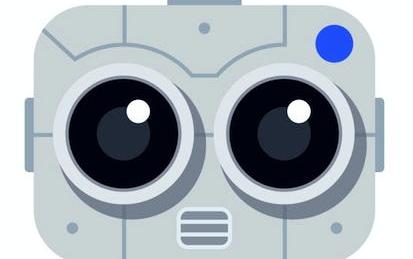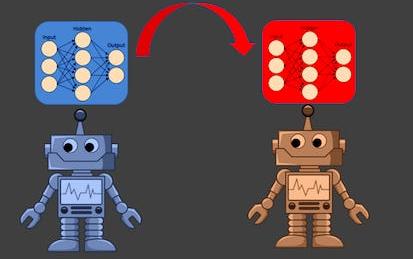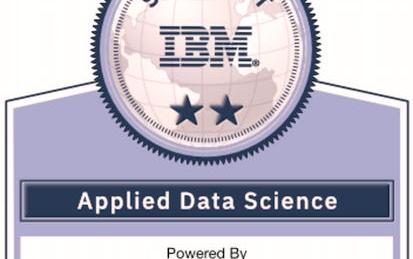

دوراتنا

Building Deep Learning Models with TensorFlow
The majority of data in the world is unlabeled and unstructured. Shallow neural networks cannot easily capture relevant structure in, for instance, images, sound, and textual data. Deep networks are capable of discovering hidden structures within this type of data. In this course you’ll use TensorFlow library to apply deep learning to different data types in order to solve real world problems.
-
Course by

-
 Self Paced
Self Paced
-
 7 ساعات
7 ساعات
-
 الإنجليزية
الإنجليزية

Deep Neural Networks with PyTorch
The course will teach you how to develop deep learning models using Pytorch. The course will start with Pytorch's tensors and Automatic differentiation package. Then each section will cover different models starting off with fundamentals such as Linear Regression, and logistic/softmax regression. Followed by Feedforward deep neural networks, the role of different activation functions, normalization and dropout layers. Then Convolutional Neural Networks and Transfer learning will be covered. Finally, several other Deep learning methods will be covered.
-
Course by

-
 Self Paced
Self Paced
-
 31 ساعات
31 ساعات
-
 الإنجليزية
الإنجليزية

Deep Learning Fundamentals with Keras
New to deep learning? Start with this course, that will not only introduce you to the field of deep learning but give you the opportunity to build your first deep learning model using thepopular Keras library.
-
Course by

-
 Self Paced
Self Paced
-
 30
30
-
 الإنجليزية
الإنجليزية

Deep Learning with Python and PyTorch
This course is the second part of a two-part course on how to develop Deep Learning models using Pytorch.
-
Course by

-
 Self Paced
Self Paced
-
 72
72
-
 الإنجليزية
الإنجليزية

Deep Learning with Tensorflow
Much of theworld's data is unstructured. Think images, sound, and textual data. Learn how to apply Deep Learning with TensorFlow to this type of data to solve real-world problems.
-
Course by

-
 الإنجليزية
الإنجليزية

Applied Deep Learning Capstone Project
In this capstone project, you'll use either Keras or PyTorch to develop, train, and test a Deep Learning model. Load and preprocess data for a real problem, build the model and then validate it.
-
Course by

-
 64
64
-
 الإنجليزية
الإنجليزية

PyTorch and Deep Learning for Decision Makers
Learn how PyTorch, a deep learning framework, can be used to automate and optimize processes through the development and deployment of state-of-the-art AI applications. The course will also help you understand the importance of data quality, how to choose the right model, and the challenges in deploying and maintaining both deep learning and machine learning applications.
-
Course by

-
 Self Paced
Self Paced
-
 15
15
-
 الإنجليزية
الإنجليزية

PyTorch Basics for Machine Learning
This course is the first part in a two part course and will teach you the fundamentals of PyTorch. In this course you will implement classic machine learning algorithms, focusing on how PyTorch creates and optimizes models. You will quickly iterate through different aspects of PyTorch giving you strong foundations and all the prerequisites you need before you build deep learning models.
-
Course by

-
 الإنجليزية
الإنجليزية

Technologies and platforms for Artificial Intelligence
This course will address the hardware technologies for machine and deep learning (from the units of an Internet-of-Things system to a large-scale data centers) and will explore the families of machine and deep learning platforms (libraries and frameworks) for the design and development of smart applications and systems.
-
Course by

-
 Self Paced
Self Paced
-
 3 ساعات
3 ساعات
-
 الإنجليزية
الإنجليزية

Deep Learning and Reinforcement Learning
This course introduces you to two of the most sought-after disciplines in Machine Learning: Deep Learning and Reinforcement Learning. Deep Learning is a subset of Machine Learning that has applications in both Supervised and Unsupervised Learning, and is frequently used to power most of the AI applications that we use on a daily basis. First you will learn about the theory behind Neural Networks, which are the basis of Deep Learning, as well as several modern architectures of Deep Learning.
-
Course by

-
 32 ساعات
32 ساعات
-
 الإنجليزية
الإنجليزية

Unsupervised Text Classification for Marketing Analytics
Marketing data is often so big that humans cannot read or analyze a representative sample of it to understand what insights might lie within. In this course, learners use unsupervised deep learning to train algorithms to extract topics and insights from text data. Learners walk through a conceptual overview of unsupervised machine learning and dive into real-world datasets through instructor-led tutorials in Python. The course concludes with a major project. This course uses Jupyter Notebooks and the coding environment Google Colab, a browser-based Jupyter notebook environment.
-
Course by

-
 Self Paced
Self Paced
-
 13 ساعات
13 ساعات
-
 الإنجليزية
الإنجليزية

Object Detection Using Facebook's Detectron2
In this 2-hour long project-based course, you will learn how to train an Object Detection Model using Facebook's Detectron2. Detectron2 is a research platform and a production library for deep learning, built by Facebook AI Research (FAIR). We will be building an Object Detection Language Identification Model to identify English and Hindi texts written which can be extended to different use cases. We will look at the entire cycle of Model Development and Evaluation in Detectron2. We will first look at how to load a dataset, visualize it and prepare it as an input to the Deep Learning Model.
-
Course by

-
 Self Paced
Self Paced
-
 3 ساعات
3 ساعات
-
 الإنجليزية
الإنجليزية

Facial Expression Classification Using Residual Neural Nets
In this hands-on project, we will train a deep learning model based on Convolutional Neural Networks (CNNs) and Residual Blocks to detect facial expressions. This project could be practically used for detecting customer emotions and facial expressions.
By the end of this project, you will be able to:
- Understand the theory and intuition behind Deep Learning, Convolutional Neural Networks (CNNs) and Residual Neural Networks.
- Import Key libraries, dataset and visualize images.
-
Course by

-
 Self Paced
Self Paced
-
 3 ساعات
3 ساعات
-
 الإنجليزية
الإنجليزية

Getting Started with Tensorflow.js
By the end of this project, you will learn how to code a smart webcam to detect people and other everyday objects using a pre-trained COCO-SSD image recognition model with Tensorflow.js.
Based on an older library called deeplearn.js, Tensorflow.js is a deep learning library that leverages Tensorflow to create, train and run inference on artificial neural network models directly in a web browser, utilizing the client's GPU/CPU resources (accelerated using WebGL). Tensorflow.js brings Tensorflow to the web!
JavaScript/Typescript experience is heavily recommended.
-
Course by

-
 Self Paced
Self Paced
-
 2 ساعات
2 ساعات
-
 الإنجليزية
الإنجليزية

AI for Everyone: Master the Basics
Learn what Artificial Intelligence (AI) is by understanding its applications and key concepts including machine learning, deep learning and neural networks.
-
Course by

-
 33
33
-
 الإنجليزية
الإنجليزية

Health Data Science Foundation
This course is intended for persons involved in machine learning who are interested in medical applications, or vice versa, medical professionals who are interested in the methods modern computer science has to offer to their field. We will cover health data analysis, different types of neural networks, as well as training and application of neural networks applied on real-world medical scenarios. We cover deep learning (DL) methods, healthcare data and applications using DL methods.
-
Course by

-
 24 ساعات
24 ساعات
-
 الإنجليزية
الإنجليزية

Recommender Systems
This specialization features Coursera Coach! A smarter way to learn with interactive, real-time conversations that help you test your knowledge, challenge assumptions, and deepen your understanding as you progress through the specialization. This specialization will teach you to build advanced recommender systems using machine learning and AI. You will begin by learning Python to evaluate datasets and create content-based and collaborative filtering systems.
-
Course by

-
 الإنجليزية
الإنجليزية
Clinical Decision Support Systems - CDSS 4
Machine learning systems used in Clinical Decision Support Systems (CDSS) require further external validation, calibration analysis, assessment of bias and fairness. In this course, the main concepts of machine learning evaluation adopted in CDSS will be explained. Furthermore, decision curve analysis along with human-centred CDSS that need to be explainable will be discussed. Finally, privacy concerns of deep learning models and potential adversarial attacks will be presented along with the vision for a new generation of explainable and privacy-preserved CDSS.
-
Course by

-
 Self Paced
Self Paced
-
 8 ساعات
8 ساعات
-
 الإنجليزية
الإنجليزية

TensorFlow: Advanced Techniques
About TensorFlow TensorFlow is an end-to-end open-source platform for machine learning. It has a comprehensive, flexible ecosystem of tools, libraries, and community resources that lets researchers push the state-of-the-art in ML, and developers easily build and deploy ML-powered applications. TensorFlow is commonly used for machine learning applications such as voice recognition and detection, Google Translate, image recognition, and natural language processing. About this Specialization Expand your knowledge of the Functional API and build exotic non-sequential model types.
-
Course by

-
 Self Paced
Self Paced
-
 الإنجليزية
الإنجليزية

Machine Learning for Trading
This 3-course Specialization from Google Cloud and New York Institute of Finance (NYIF) is for finance professionals, including but not limited to hedge fund traders, analysts, day traders, those involved in investment management or portfolio management, and anyone interested in gaining greater knowledge of how to construct effective trading strategies using Machine Learning (ML) and Python. Alternatively, this program can be for Machine Learning professionals who seek to apply their craft to quantitative trading strategies.
-
Course by

-
 Self Paced
Self Paced
-
 الإنجليزية
الإنجليزية

Transfer Learning for Food Classification
In this hands-on project, we will train a deep learning model to predict the type of food and then fine tune the model to improve its performance. This project could be practically applied in food industry to detect the type and quality of food. In this 2-hours long project-based course, you will be able to:
- Understand the theory and intuition behind Convolutional Neural Networks (CNNs).
- Understand the theory and intuition behind transfer learning.
- Import Key libraries, dataset and visualize images.
- Perform data augmentation.
-
Course by

-
 Self Paced
Self Paced
-
 3 ساعات
3 ساعات
-
 الإنجليزية
الإنجليزية

Applied Data Science
This action-packed Specialization is for data science enthusiasts who want to acquire practical skills for real world data problems. If you’re interested in pursuing a career in data science, and already have foundational skills or have completed the Introduction to Data Science Specialization, this program is for you! This 4-course Specialization will give you the tools you need to analyze data and make data driven business decisions leveraging computer science and statistical analysis.
-
Course by

-
 Self Paced
Self Paced
-
 الإنجليزية
الإنجليزية

Fine Tune BERT for Text Classification with TensorFlow
This is a guided project on fine-tuning a Bidirectional Transformers for Language Understanding (BERT) model for text classification with TensorFlow. In this 2.5 hour long project, you will learn to preprocess and tokenize data for BERT classification, build TensorFlow input pipelines for text data with the tf.data API, and train and evaluate a fine-tuned BERT model for text classification with TensorFlow 2 and TensorFlow Hub.
-
Course by

-
 Self Paced
Self Paced
-
 3 ساعات
3 ساعات
-
 الإنجليزية
الإنجليزية

Machine Learning: Theory and Hands-on Practice with Python
In the Machine Learning specialization, we will cover Supervised Learning, Unsupervised Learning, and the basics of Deep Learning. You will apply ML algorithms to real-world data, learn when to use which model and why, and improve the performance of your models. Starting with supervised learning, we will cover linear and logistic regression, KNN, Decision trees, ensembling methods such as Random Forest and Boosting, and kernel methods such as SVM. Then we turn our attention to unsupervised methods, including dimensionality reduction techniques (e.g., PCA), clustering, and recommender systems.
-
Course by

-
 Self Paced
Self Paced
-
 الإنجليزية
الإنجليزية

Advanced Deployment Scenarios with TensorFlow
Bringing a machine learning model into the real world involves a lot more than just modeling. This Specialization will teach you how to navigate various deployment scenarios and use data more effectively to train your model. In this final course, you’ll explore four different scenarios you’ll encounter when deploying models. You’ll be introduced to TensorFlow Serving, a technology that lets you do inference over the web. You’ll move on to TensorFlow Hub, a repository of models that you can use for transfer learning.
-
Course by

-
 Self Paced
Self Paced
-
 13 ساعات
13 ساعات
-
 الإنجليزية
الإنجليزية



